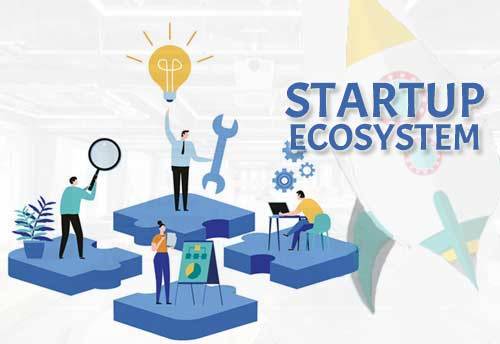#startup ecosystem
Text
Building a Prosperous Bharat: BJP's Pledge for Economic Growth
In a bold assertion of vision and commitment, the Bharatiya Janata Party (BJP) has unveiled its manifesto 'Modi ki Guarantee 2024', promising to propel India into the global economic elite by securing its position as the third largest economy in the world. With an unwavering focus on sustainable growth and inclusive development, the BJP aims to revolutionize India's economic landscape through a series of innovative reforms and strategic investments.

At the heart of the BJP's economic agenda lies a steadfast dedication to infrastructure development as a catalyst for employment generation. Recognizing the pivotal role played by infrastructure in driving economic progress, the party pledges to continue its unprecedented investment in this sector, creating a plethora of job opportunities across the nation. Moreover, special emphasis will be placed on bolstering employment prospects in key sectors such as manufacturing and tourism, unleashing the full potential of Bharat's burgeoning workforce.
Central to the BJP's manifesto is the promise of ushering in a "next generation of reforms" aimed at positioning India as a global economic powerhouse. Through a judicious mix of policy interventions and strategic initiatives, the party envisions a future where India not only achieves but surpasses its current economic standing, emerging as a beacon of prosperity and opportunity on the world stage.
The BJP's commitment to fostering economic growth is underscored by its comprehensive approach to infrastructure development. From modernizing road networks to enhancing rail and metro connectivity, from establishing state-of-the-art EV charging stations to constructing new airports, the party leaves no stone unturned in its quest to build a robust infrastructure framework that fuels economic expansion and facilitates seamless connectivity across the nation.
In tandem with its infrastructure thrust, the BJP lays significant emphasis on bolstering the manufacturing sector, recognizing it as a key driver of economic growth and employment generation. Through initiatives such as the Production Linked Incentive (PLI) scheme and Make in India, the party aims to transform India into a global manufacturing hub, streamlining regulatory processes, attracting investments, and fostering innovation and research in key sectors such as defence, automobile, and semiconductor manufacturing.
A cornerstone of the BJP's economic vision is its unwavering support for startups and entrepreneurship. By expanding the startup ecosystem to tier-2 and tier-3 cities, enhancing access to funding through schemes like the Startup India Seed Fund, and fostering a culture of innovation through initiatives such as Atal Tinkering Labs, the party seeks to unleash the entrepreneurial spirit of the nation, driving job creation and fostering economic dynamism.
In a bid to empower small businesses and entrepreneurs, the BJP pledges to double the loan limit under the PM Mudra scheme, providing greater access to credit and capital for aspiring entrepreneurs. Moreover, the party vows to simplify the GST portal, enhance ease of doing business, and undertake comprehensive reforms to streamline economic legislation, ensuring a conducive environment for business growth and investment.
Crucially, the BJP's economic vision is anchored in a commitment to inclusivity and social welfare. By integrating social security schemes for unorganized workers with the Digital India network, ensuring periodic review of national floor wages, and extending support to gig workers and migrant laborers through platforms like the e-Shram portal, the party seeks to ensure that the fruits of economic progress reach every strata of society.
In essence, the BJP's manifesto represents a bold blueprint for economic transformation, anchored in the principles of growth, inclusivity, and sustainability. With a clear vision and unwavering commitment, the party aims to steer India towards a future of prosperity and opportunity, where every citizen can aspire to achieve their fullest potential in a thriving and dynamic economy.
#Bharatiya Janata Party#Economic Growth#Infrastructure Development#Manufacturing Hub#Startup Ecosystem#Employment Opportunities
0 notes
Text
Why and how to invest in the booming Indian startup ecosystem

In recent years, India's entrepreneurial landscape has undergone a seismic transformation, evolving into a hotbed of innovation and growth. The Indian startup ecosystem, once in its nascent stages, has now matured into a thriving hub, attracting global attention and substantial investments. This blog aims to delve deep into the compelling reasons behind investing in India's burgeoning startup ecosystem, uncovering the opportunities, challenges, and strategies that define this dynamic realm.
The Meteoric Rise of India's Startup Ecosystem
India's journey in fostering startups is a tale of resilience, innovation, and exponential growth. Fuelled by a confluence of factors including a burgeoning youth population, a tech-savvy talent pool, access to capital, and government initiatives fostering entrepreneurship, the Indian startup ecosystem has catapulted itself onto the global stage.
The Numbers Speak: Booming Landscape and Promising Metrics
The numbers underscore the burgeoning success of India's startup ecosystem. A steep rise in funding activities, a surge in the number of unicorns—privately held startups valued at over a billion dollars—and a diverse range of startups spanning sectors such as technology, e-commerce, fintech, health-tech, and edtech, showcase the ecosystem's robustness and potential.
Why Invest in India's Startup Ecosystem?
1. Massive Market Potential: India's population of over 1.3 billion offers a vast and diverse market, fostering ample opportunities for startups to scale and innovate across sectors.
2. Tech Innovation and Disruption: The Indian startup space is witnessing unprecedented innovation, leveraging technology to disrupt traditional sectors, and addressing unique challenges with groundbreaking solutions.
3. Government Support and Initiatives: Proactive government schemes such as 'Startup India' and regulatory reforms aim to streamline operations, provide funding support, and create an enabling environment for startups to thrive.
4. Diverse Investment Avenues: The ecosystem offers diverse investment avenues across sectors, providing investors with opportunities to diversify portfolios and tap into high-growth sectors.
5. Global Recognition and Potential for Scale: Indian startups are gaining global recognition, attracting investments from international players, and have the potential to scale beyond national borders.
Navigating the Indian Startup Ecosystem: Strategies for Investment
1. In-depth Market Research and Due Diligence: Conducting thorough market research, analyzing trends, evaluating the competitive landscape, and assessing scalability is crucial before investing in any startup.
2. Sectoral Focus and Portfolio Diversification: Identifying promising sectors aligning with personal interests or expertise and diversifying investments across multiple startups spread across different sectors minimizes risks.
3. Engagement with Incubators and Accelerators: Collaborating with incubators, accelerators, and startup hubs offers access to a pool of vetted startups, mentorship, and networking opportunities for potential investments.
4. Strategic Partnerships and Networking: Building relationships with key players in the ecosystem, industry experts, and startup communities enhances insights, deal flows, and potential collaboration opportunities.
5. Risk Mitigation and Long-term Vision: Understanding the risk appetite, setting realistic expectations, and adopting a long-term perspective are essential for navigating the inherent volatility of startup investments.
Unveiling India's Startup Landscape: A Closer Look at Opportunities
1. Technological Innovation:
The Indian startup ecosystem is characterized by its relentless pursuit of technological innovation. Startups leverage emerging technologies such as Artificial Intelligence (AI), Machine Learning (ML), Blockchain, and Internet of Things (IoT) to disrupt traditional sectors and address diverse market needs. This innovation drive positions India as a global leader in tech-driven solutions, offering attractive investment opportunities.
2. E-commerce and Consumer Internet:
E-commerce giants and consumer internet startups in India have revolutionized the way businesses engage with consumers. The rapid digitization of services, coupled with a burgeoning e-commerce market, presents lucrative investment prospects. Startups catering to online retail, fintech, food delivery, and digital entertainment segments continue to attract substantial investments.
3. Fintech Revolution:
India's fintech sector has experienced exponential growth, driven by digital payments, peer-to-peer lending, insurtech, and wealth management platforms. The government's push towards a cashless economy through initiatives like Unified Payments Interface (UPI) and digital wallets has propelled the fintech industry, offering fertile ground for investors seeking disruptive financial solutions.
4. Health-tech and Edtech Pioneers:
The COVID-19 pandemic accelerated the adoption of health-tech and edtech solutions, amplifying investment opportunities in these sectors. Startups offering telemedicine, health-tech platforms, online education, e-learning tools, and upskilling solutions witness increased investor interest due to their potential societal impact and scalability.
5. Sustainable and CleanTech Solutions:
With a growing focus on sustainability, startups in the clean energy, renewable resources, and sustainability sectors gain prominence. Innovations in clean technology, green energy solutions, waste management, and environmental sustainability present avenues for investors seeking impactful and environmentally conscious opportunities.
Challenges and Considerations for Investors:
1. Market Volatility and Risk Profile:
While the Indian startup ecosystem offers immense potential, it also carries inherent risks associated with early-stage investments. Factors like market volatility, regulatory uncertainties, and evolving consumer behaviors necessitate a cautious approach and a diversified investment strategy.
2. Regulatory Landscape and Compliance:
Adapting to evolving regulatory frameworks poses a challenge for investors. Understanding compliance requirements, policy changes, and legal intricacies is crucial for navigating the complex regulatory landscape in India.
3. Competition and Differentiation:
The competitive landscape in India's startup ecosystem is intense, with numerous players vying for market share. Investors must assess a startup's differentiation strategy, scalability, and ability to withstand market competition before committing funds.
4. Exit Strategies and Liquidity:
Planning exit strategies and achieving liquidity in early-stage investments can be challenging. Investors need to evaluate a startup's potential for growth, profitability, and potential exit avenues to maximize returns.
Strategies for Successful Investment in India's Startup Ecosystem:
1. Collaborate with Incubators and Accelerators:
Engaging with established incubators, accelerators, and venture capital firms enables access to curated startup opportunities, mentorship, and due diligence support, minimizing investment risks.
2. Diversification and Portfolio Management:
Diversifying investments across multiple startups, sectors, and stages mitigates risks and enhances the potential for returns. Managing a well-balanced portfolio minimizes exposure to individual startup volatility.
3. Thorough Due Diligence and Research:
Conducting comprehensive due diligence, evaluating a startup's business model, market fit, scalability, team expertise, and financial viability is crucial before making investment decisions.
4. Network and Industry Insights:
Building a strong network within the startup ecosystem, engaging with industry experts, attending conferences, and staying updated on market trends and developments aids in making informed investment choices.
5. Long-term Vision and Patience:
Adopting a patient approach with a long-term vision is essential in the startup investment landscape. Understanding that startups require time to scale and yield returns is crucial for successful investments.
Importance of Investing in Indian Startups:
1. Driving Innovation and Job Creation: Startups are hotbeds of innovation, driving technological advancements and creating employment opportunities.
2. Economic Growth and GDP Contribution: Startups contribute significantly to economic growth, attracting investments, generating revenue, and adding to the country's Gross Domestic Product (GDP).
3. Supporting Entrepreneurship: Investment in startups nurtures entrepreneurship and encourages a culture of risk-taking and innovation. It empowers aspiring entrepreneurs to transform ideas into viable businesses.
4. Global Competitiveness: A vibrant startup ecosystem enhances a country's competitiveness on a global scale. Indian startups gaining recognition globally attract foreign investments and partnerships, boosting the nation's image.
5. Addressing Societal Challenges: Many startups focus on solving societal issues, such as healthcare accessibility, education, financial inclusion, and sustainability, thus contributing to social welfare.
6. Attracting Foreign Investments: A thriving startup ecosystem attracts foreign investors seeking high-growth opportunities. Foreign investments bring in capital, expertise, and global exposure to Indian startups.
Investing in startups in India offers a plethora of opportunities across diverse sectors, fostering innovation, economic growth, and societal impact. It plays a pivotal role in shaping India's economic future, driving innovation, creating jobs, and positioning the country as a global player in the startup landscape.
India's startup ecosystem stands as a beacon of innovation, disruption, and entrepreneurial fervor, inviting investors to be part of its transformative journey. With an array of sectors offering innovation-driven solutions, technology disruptions, and societal impact, investing in India's startup ecosystem holds promise for investors seeking high-growth opportunities. While challenges and risks persist, strategic investment decisions backed by thorough research, diversification, and an understanding of the ecosystem's dynamics can unlock substantial returns and contribute to the evolution of India's vibrant startup landscape.
This post was originally published on: Foxnangel
#indian startups#indian startup ecosystem#startup ecosystem#indian startup company#investing in startups#invest in india#franchise in india#foxnangel
1 note
·
View note
Text
India and China Economic Performance: A Comparative Analysis
India and China Economic Performance: A Comparative Analysis #EconomicGrowth #AsiaEconomy #StartupIndia #StartupChina #GDPgrowth #TradeRelations
The economies of India and China are the two largest and fastest-growing in Asia, and they have both experienced significant changes and challenges in the last five years. Here are some of the key indicators and trends of their economic performance:
GDP: China’s nominal GDP grew from $11.23 trillion in 2016 to $17.82 trillion in 2021, an increase of 58.6%. India’s nominal GDP grew from $2.26…

View On WordPress
0 notes
Text

#entrepreneurship magazine#entrepreneurship#business innovation#entrepreneurial mindset#success in small business#leadership success#low cost business ideas with high profit#business investment opportunities#entrepreneurial journey#startup ecosystem#growth hacking#entrepreneurship culture#growthhackers#tech entrepreneurship#entrepreneurial ventures#growth hackers digital#entrepreneurial leadership
0 notes
Text
The Benefits of Hiring a Corporate Financial Advisor for Your Business

In the competitive and ever-changing world of business, making informed financial decisions is crucial for a company's success and growth. Whether you're a startup, a small to medium-sized enterprise, or a large corporation, the benefits of hiring a corporate financial advisor cannot be overstated. These professionals play a vital role in helping businesses navigate the complex landscape of finance, ensuring financial stability, growth, and long-term sustainability.
In this article, we will explore the numerous advantages of enlisting the services of a corporate financial advisor and how they can positively impact your business.
Expertise and Knowledge
Corporate financial advisors are experts in their field. They possess in-depth knowledge of financial strategies, regulations, tax laws, and industry trends. When you hire a financial advisor, you're gaining access to a wealth of knowledge and experience that can help you make informed decisions. They can provide valuable insights into your financial situation, helping you identify opportunities and avoid potential pitfalls.
Tailored Financial Strategies
Every business is unique, with its own set of goals and challenges. A corporate financial advisor works closely with you to develop a customized financial strategy that aligns with your specific objectives. Whether it's optimizing cash flow, managing debt, or planning for expansion, they tailor their recommendations to your business's needs.
Risk Management
The business world is fraught with risks, from economic fluctuations to unexpected crises. Corporate financial advisors excel in risk management. They help you identify potential risks and devise strategies to mitigate them. By proactively addressing risks, you can safeguard your company's financial health.
Financial Planning and Forecasting
Corporate financial advisors assist in creating financial plans and forecasts. This process involves setting realistic financial goals, creating budgets, and projecting future financial performance. With their guidance, you can chart a clear path toward your financial objectives and make necessary adjustments as conditions change.
Cost Reduction and Efficiency
One of the key benefits of hiring a financial advisor is cost reduction. They can identify areas where you can cut unnecessary expenses and improve operational efficiency. This not only saves you money but also enhances your bottom line.
Access to Capital
Securing funding is often a major concern for businesses. Corporate financial advisors have extensive networks and can help you access various sources of capital, whether it's through traditional loans, venture capital, or private equity. They also assist in preparing the necessary documentation and presentations for funding applications.
Compliance and Regulation
Financial regulations are constantly evolving. Corporate financial advisors keep abreast of these changes, ensuring that your business remains in compliance with tax laws, accounting standards, and other financial regulations. This helps prevent legal issues and potential fines.
Focus on Core Business Activities
By delegating financial management to a corporate financial advisor, you free up valuable time and resources. This allows you to concentrate on your core business activities, such as product development, sales, and customer service, while leaving the financial intricacies to the experts.
Long-Term Financial Stability
A corporate financial advisor doesn't just address short-term financial concerns; they also help you plan for the long term. With their guidance, you can build a solid foundation for future growth and ensure the ongoing financial stability of your business.
Conclusion
In the fast-paced and complex world of business, having a corporate financial advisor by your side is a wise investment. The benefits of their expertise, tailored strategies, risk management, and financial planning can make a significant difference in your business's success. With their support, you can navigate the financial challenges and opportunities that lie ahead, ensuring a brighter and more secure future for your company. So, if you haven't already, consider enlisting the services of a corporate financial advisor for your business's financial well-being and growth.
Nangia Andersen offers the key to unlocking your business's financial potential. Our corporate financial advisors bring a wealth of expertise to the table, providing tailored financial strategies, expert risk management, and compliance guidance. By partnering with us, you gain access to a dedicated team committed to your business's long-term financial stability, efficient operations, and growth. Secure your company's financial future with Nangia Andersen and focus on what you do best – driving your business forward.
0 notes
Text
100+ Ideas for Entrepreneurial Startups
Choose a startup idea that aligns with your interests, skills, and market demand. Conduct thorough market research, validate your concept, and create a comprehensive business plan to bring your entrepreneurial vision to life. Remember to to thoroughly research your chosen startup idea, identify your target market, and craft a comprehensive business plan to set yourself up for success in your…

View On WordPress
#angel investors#Business#business development#business growth#business innovation#business planning#business scalability#business strategy#entrepreneur#entrepreneur lifestyle#entrepreneurial mindset#entrepreneuship#growth hacking#innovation#lean startup#small business#startup#startup advice#startup culture#startup ecosystem#startup success#startup tips#startup trends#venture capital
0 notes
Text
The Game Changer: Role of Artificial Intelligence in Startups
In the ever-evolving world of startups, staying ahead of the curve can be a game-changer. It's a place where innovation and technology play vital roles, and in recent years, one technology has stood out as a superstar in this realm: Artificial Intelligence (AI). But what exactly is the role of AI in startups, and why is it so crucial? Let's break it down in simple terms.

What's the Buzz About AI in Startups?
AI is like the secret sauce of modern startups. It's the brainpower that powers innovation and efficiency. Unlike traditional software, AI systems learn from data and improve their performance over time. This gives startups an incredible edge, and here's how:
Automated Decision-Making: One of the primary benefits of AI is its ability to make decisions and predictions based on data. Startups can use AI to automate routine tasks, saving time and reducing errors.
Data Analysis: AI can crunch massive datasets faster and more accurately than humans. Startups can use AI to analyze market trends, customer preferences, and more, helping them make informed decisions.
Personalization: AI can create personalized experiences for users. Think of Netflix suggesting shows or Amazon recommending products. Startups can use AI to understand their customers better and tailor their offerings.
Cost Savings: By automating tasks, reducing errors, and improving efficiency, AI can save startups money.
Innovation: AI is a breeding ground for innovation. Startups can use AI to create new products or enhance existing ones. Whether it's self-driving cars or health tech, AI is a driving force behind today's coolest inventions.
How AI Is Used in Startups
Now, let's dive into some real-world examples of how startups are using AI:
1. Chatbots and Virtual Assistants: Ever had a conversation with a website that felt surprisingly human? That's probably a chatbot powered by AI. Startups use chatbots to provide instant customer support, answer queries, and even process orders.
2. Predictive Analytics: Startups use AI to predict future trends, which can be a game-changer for businesses. For instance, an e-commerce startup might use AI to forecast which products will sell best next month.
3. Healthcare: AI is making waves in healthcare startups. It can analyze medical records, assist in diagnostics, and even predict disease outbreaks.
4. Marketing and Sales: AI can analyze consumer behavior and provide valuable insights for marketing strategies. It's also used in sales for lead scoring and customer relationship management.
5. Finance: AI-powered algorithms can help startups manage their finances, from fraud detection to investment strategies.
6. Language Processing: AI has made translation apps and language-learning platforms smarter. Startups can use AI to break down language barriers.
7. Image and Video Analysis: Startups in industries like security, agriculture, and entertainment use AI to analyze images and videos for insights.
The Challenges
While AI is a tremendous asset, it's not without its challenges. Startups often face hurdles like:
Cost: Developing and implementing AI systems can be expensive.
Data Privacy: Handling sensitive data requires strong security measures to protect user information.
Expertise: Finding skilled AI professionals can be a challenge. The demand for AI experts is high.
Ethical Considerations: Startups need to be mindful of the ethical implications of AI, such as bias in algorithms.
The Future of AI in Startups
The future of AI in startups is incredibly promising. As AI technology advances, startups will continue to find creative ways to leverage it. Here are a few trends to watch for:
AI-Enhanced Products: Expect to see more AI-powered products that improve our daily lives, from self-driving cars to intelligent home appliances.
Sustainable Tech: AI can help startups make more sustainable choices by optimizing energy consumption and reducing waste.
Enhanced Customer Experiences: AI will continue to personalize the user experience, making products and services more tailored to individual needs.
Global Accessibility: As AI technology becomes more accessible, more startups worldwide will be able to harness its power for innovation.
Conclusion
The role of AI in startups is transformative. It's a tool that empowers small businesses to compete with industry giants, to innovate, and to create a better future. As AI technology continues to evolve, startups that harness its power will be the ones leading the way into an exciting and dynamic future.
So, if you're thinking of starting a business or you're part of a startup, keep an eye on AI. It might just be the secret sauce that takes your venture to the next level. The future is bright, and AI is lighting the way.
0 notes
Text
Top 100 Startup Ideas for Students (2023)
So you are searching for a perfect Startup idea to get started, right?
Telling from our own experience of working at different ventures and working on our own startups. Here you will see all real life startup ideas. Instead of some unrealistic ideas.
Students need to focus on both studies and side hustles at the same time. So, We have carefully hand picked this awesome list of startup ideas,…

View On WordPress
#cofounder#coworkers#digital economy#Digital Nomad#entrepreneurship#founder#Freelancer#Innovation#inspiration#maker#Pattaya Startups#rPod Coworking Space#Startup Ecosystem#student#university
0 notes
Text
Top 100 Startup Ideas for Students (2023)
So you are searching for a perfect Startup idea to get started, right?
Telling from our own experience of working at different ventures and working on our own startups. Here you will see all real life startup ideas. Instead of some unrealistic ideas.
Students need to focus on both studies and side hustles at the same time. So, We have carefully hand picked this awesome list of startup ideas,…

View On WordPress
#cofounder#coworkers#digital economy#Digital Nomad#entrepreneurship#founder#Freelancer#Innovation#inspiration#maker#Pattaya Startups#rPod Coworking Space#Startup Ecosystem#student#university
0 notes
Text
India’s Emerging Startup Ecosystem: A Look into the Future / Swiftnlift Best Business Magazine

India has emerged as a hub for innovative and ambitious entrepreneurs, leading to the emergence of several startups across various sectors. With the rise of technological advancements and increasing investments, the Indian startup ecosystem has seen a significant boom in recent years. In this article, we will take a deep dive into the Indian startup ecosystem and explore its current state, growth trajectory, and future prospects.
Current State of the Indian Startup Ecosystem
The Indian startup ecosystem is rapidly evolving and is no longer confined to just a few cities like Bangalore or Mumbai. Startups are emerging in smaller cities like Ahmedabad, Jaipur, and Pune, creating a more diverse and decentralized ecosystem. The ecosystem is witnessing significant growth in sectors like fintech, edtech, healthcare, and e-commerce.
The Indian startup ecosystem is rapidly evolving and is no longer confined to just a few cities like Bangalore or Mumbai. Startups are emerging in smaller cities like Ahmedabad, Jaipur, and Pune, creating a more diverse and decentralized ecosystem. The ecosystem is witnessing significant growth in sectors like fintech, edtech, healthcare, and e-commerce.
The Indian startup ecosystem is also witnessing a significant increase in the number of incubators and accelerators. These organizations provide mentorship, networking opportunities, and funding to startups, helping them scale their businesses.
Growth Trajectory of the Indian Startup Ecosystem
Fintech startups are revolutionizing the Indian financial sector by offering innovative solutions like digital wallets, payment gateways, and peer-to-peer lending platforms. Startups like Paytm and PhonePe have transformed the way people make transactions in India. The fintech sector is expected to reach $150 billion by 2025, according to a report by NASSCOM. India’s Emerging Startup Ecosystem: A Look into the Future / Swiftnlift Best Business Magazine
https://swiftnlift.in/articles/indias-emerging-startup-ecosystem-a-look-into-the-future/
#pune#swiftnlift#magazine#articles#Articles in English#List of Articles#Business Article#Swiftnlift Best Business Magazine#Article#Startup Ecosystem#India’s Emerging#Startup India#Indian star up#Future
1 note
·
View note
Text
Cara membuat minutes of meeting
Membuat Minutes of meeting atau biasa disebut MoM bisa sama menegangkannya dengan menekan "kirim" pada email campaign ke 500.000 orang atau memberikan presentasi kepada orang banyak. Jika Anda melewatkan satu detik saja, Anda dapat melewatkan seluruh bagian catatan yang ditunggu-tunggu oleh anggota organisasi Anda atau publik.
Jika Anda ingin membuat catatan yang lengkap, akurat, dan efektif tanpa mendengarkan kembali rekaman rapat nanti, cara terbaik untuk melakukannya adalah dengan menggunakan alat pintar. Catatan rapat otomatis dapat membuat proses pembuatan catatan Anda bebas genggam, sehingga Anda dapat menjadi peserta aktif dalam rapat Anda (dan menghindari kepanikan internal saat Anda tidak sengaja tertidur).
Cobalah gunakan Fireflies AI yang menyediakan transkripsi otomatis rapat langsung dan file audio yang diunggah dalam hitungan menit. Ini adalah perekam rapat cerdas yang didukung AI dan platform sentral untuk kolaborasi pasca rapat juga.
1 note
·
View note
Text
instagram
#nashik#shreekant patil#startupindia#india#entrepreneurship#parentnashik#mentor#shreekant patil nashik#startup#news#NIMA#NIMA STARTUP HUB#maharashtra#MSME#standup india#startup mentor in nashik#startup india mentor#startup ecosystem#Instagram
0 notes
Text
गुरुग्राम में बिल्डिंग से गिरकर OYO के फाउंडर रितेश अग्रवाल के पिता की मौत
OYO रूम्स के संस्थापक और CEO रितेश अग्रवाल के पिता का भारत के गुरुग्राम में एक इमारत से गिरने के बाद निधन हो गया। घटना 9 मार्च, 2023 को हुई और पुलिस ने मामले की जांच शुरू कर दी है। शुरुआती खबरों के मुताबिक, पीड़ित डीएलएफ फेज-1 इलाके में एक इमारत की चौथी मंजिल से गिर गया, और उसे तुरंत अस्पताल ले जाया गया, जहां उसने दम तोड़ दिया।
रितेश अग्रवाल, जो वर्तमान में संयुक्त राज्य अमेरिका में हैं, ने सोशल…

View On WordPress
0 notes
Text
How to Earn Marketing-Qualified Leads While Building Your Startup's Brand?

Nowadays, startups face an uphill battle when it comes to building their brand and gaining traction among their TG. With an increasing number of companies aiming for the same attention, it can be challenging to stand out from the crowd. Still, startups that are focusing on growth, understand the significance of brand building and earning marketing qualified leads (MQLs), simultaneously, from day 1.
Let's explore some effective ways for startups to achieve this thing:
Develop a Strong Content Marketing Strategy: One of the most effective ways for startups to create a brand identity and earn MQLs, is by developing a strong content marketing strategy. By creating high-quality content that provides value to their TG, you can establish their brand as an authority within their category. In addition, a well- written and informative content is more likely to be appreciated by others, which can help them earn MQL.
Using Social Media Platforms: Another effective way for startups to build their brand and earn MQLs can be, by using social media platforms. By establishing a strong social media presence and engaging with their followers, they can increase their brand's visibility and attract further attention from their potential customers. Also, social media platforms create opportunities for startups to connect with influencers and other industry leaders, which can help them, earn MQLs.
Focus on Building Association: Building connections with other industry players can be another effective way for startups to build their brand image and as well as earn MQLs. By participating in events and conferences for networking, they can connect with other startups, influencers, and industry leaders. Also, by developing connections with bloggers and journalists related to their industry, they can increase your chances of getting featured in publications and earning MQLs.
Use Search Engine Optimization (SEO): SEO is another effective way for startups to make their brand and earn MQLs. By optimizing their website and content for relevant keywords, they can increase their visibility in Search Engine Result Pages ( SERPs). This can help you attract further business to their website and earn MQLs from high-authority websites in their industry.
Offer Value to Target Audience: Eventually, the key to building a strong brand and earning MQLs is to offer value to your target audience. By furnishing high-quality products or services to address the pain points of their TG, startups can establish themselves as secure and dependable brands. This can lead to word-of-mouth referrals, positive reviews, and other opportunities to earn quality business leads.
FAQs:
Q: Can startups focus solely on sales without building their brand?
A: While startups can focus solely on sales, building their brand is essential for long-term success. By establishing a strong brand, startups can build trust with their target audience and differentiate themselves from their competitors.
Q: How long does it take for startups to see results from their marketing efforts?
A: Results from marketing efforts can vary depending on the industry, target audience, and marketing channels utilized. However, startups can typically expect to see results within a few months of implementing their marketing strategy.
Q: Should startups prioritize building their brand or earning MQLs?
A: Startups should focus on both building their brand and earning MQLs simultaneously. By doing so, they can establish themselves as an authority in their industry while also increasing their visibility and attracting more traffic to their website.
Q: How can startups build relationships with other industry players?
A: Startups can build relationships with other industry players by attending relevant networking-focused events (Offline or Online).
If you like my perspective on this topic, then you may also like to explore these:
10 important KPIs to measure the success of a marketing campaign
Is RSS feed submission in SEO, a spam work?
How to use Slideshare in content marketing?
How to use Reditt as a tool for content marketing?
How to use Discord server as a tool for content marketing?
How to use Metaverse as a tool for content marketing?
#start up#startup ecosystem#brand marketing#digital marketing#content marketing#seotips#social media marketing#lead generation
0 notes
Text

#entrepreneurship magazine#entrepreneurship#business innovation#entrepreneurial mindset#success in small business#leadership success#low cost business ideas with high profit#business investment opportunities#entrepreneurial journey#startup ecosystem#growth hacking#entrepreneurship culture#growthhackers#tech entrepreneurship#entrepreneurial ventures#growth hackers digital#entrepreneurial leadership
0 notes
Text
From Idea to Market: How Business Ecosystems Support Startup Growth

Starting a business is like embarking on a thrilling adventure. It begins with an idea, a spark of innovation that has the potential to change the world. However, the journey from that initial concept to a successful market presence is riddled with challenges, uncertainties, and risks. This is where business ecosystems step in, playing a vital role in supporting startup growth and facilitating the transition from idea to market reality.
Understanding the Startup Journey
The path from idea to market is a complex and multifaceted one. Startups face a range of challenges, including:
Resource Constraints: Startups often operate with limited financial resources, making it challenging to hire talent, invest in technology, or scale operations.
Market Access: Breaking into established markets can be difficult, as startups must compete with larger, well-established competitors.
Risk Management: The startup world is inherently risky, and managing those risks effectively is essential for survival and growth.
Lack of Experience: Many entrepreneurs are first-time business owners and may lack the experience and knowledge needed to navigate the complexities of running a company.
Enter the Business Ecosystem
A business ecosystem is a dynamic network of organizations, individuals, and resources that interact to create, deliver, and capture value. In the context of startups, a business ecosystem provides a supportive environment where entrepreneurs can access the necessary resources, expertise, and opportunities to grow their ventures.
Access to Funding
One of the most critical aspects of startup growth is securing funding. Business ecosystems often include venture capitalists, angel investors, and crowdfunding platforms that can provide the necessary capital to turn a concept into a viable business. These investors not only offer financial support but also bring valuable expertise and connections to the table.
Mentorship and Guidance
Navigating the startup landscape can be daunting, especially for first-time entrepreneurs. Business ecosystems frequently offer mentorship programs where experienced industry professionals provide guidance, share their insights, and help startups avoid common pitfalls. These mentors can offer advice on everything from business strategy to marketing and sales.
Collaborative Partnerships
Within a business ecosystem, startups can form collaborative partnerships with other companies or organizations. These partnerships can lead to joint ventures, strategic alliances, or co-development opportunities, allowing startups to leverage the strengths of larger, more established players.
Access to Talent
Hiring skilled talent is crucial for startup growth. Business ecosystems often attract a pool of talented individuals, including tech-savvy professionals, marketers, and designers. Startups can tap into this talent pool, whether by hiring freelancers, interns, or full-time employees.
Market Validation
Business ecosystems provide a platform for startups to test their ideas and products within a real market environment. Early adopters, beta testers, and feedback from ecosystem participants can help validate a startup's offering and identify areas for improvement.
Regulatory Support
Navigating the legal and regulatory landscape can be a significant challenge for startups, especially in highly regulated industries. Business ecosystems may include legal and compliance experts who can help startups navigate these complexities and ensure they are operating within the bounds of the law.
Access to Customers
Established companies within the ecosystem can often provide startups with access to their customer base. This can significantly accelerate market penetration and help startups gain traction more quickly.
The Success Stories
Countless successful startups owe their achievements, at least in part, to the support of business ecosystems. Silicon Valley is perhaps the most famous example, with its dense network of tech companies, venture capitalists, and supportive infrastructure. Companies like Apple, Google, and Facebook all started as small startups within this ecosystem.
Conclusion
The journey from a brilliant idea to a thriving business is an arduous one, and it's rarely accomplished in isolation. Business ecosystems serve as nurturing environments where startups can find the resources, mentorship, partnerships, and funding needed to transform their ideas into successful ventures. By leveraging the support of these ecosystems, entrepreneurs increase their chances of achieving sustainable growth and making their mark on the market. So, for anyone embarking on the exciting adventure of entrepreneurship, remember that a supportive business ecosystem can be your greatest ally on the path to success.
Empowering Startups Through Business Ecosystems. Explore how Nangia Andersen, a leader in financial and business advisory services, champions the journey from innovative startup ideas to thriving market presence. Discover how our expertise and extensive network of resources help entrepreneurs navigate challenges, secure funding, and leverage collaborative partnerships, propelling their startups toward success."
0 notes